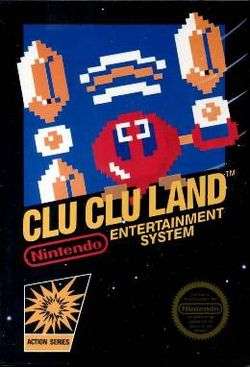Clu Clu Land
| Clu Clu Land | |
|---|---|
 | |
| Developer(s) | Nintendo Research & Development 1 |
| Publisher(s) | Nintendo |
| Composer(s) | Akito Nakatsuka[1] |
| Platform(s) | NES, Famicom Disk System, Sharp Zaurus, Game Boy Advance, Nintendo GameCube (Animal Crossing game), Virtual Console |
| Release date(s) |
NES/Famicom Famicom Disk System
Sharp Zaurus GBA
Virtual Console ‹See Tfd›
Nintendo 3DS Wii U |
| Genre(s) | Puzzle |
| Mode(s) | Single-player, multiplayer |
Clu Clu Land (Japanese: クルクルランド Hepburn: Kurukuru Rando) is an arcade and Nintendo Entertainment System game released in 1984 in Japan, later released in North America in 1985 as a Nintendo Entertainment System launch title, and in Europe in 1987. It was released for the Wii Virtual Console in North America in 2008 and in Europe and Japan in 2009, for the Nintendo 3DS Virtual Console in Japan in 2013 and in North America and Europe in 2014, and for the Wii U Virtual Console in 2013.
Title
Although "Clu Clu Land" is the official English title for the game, "Clu Clu" is actually a romanization of "Kuru Kuru", a Japanese onomatopeia word that refers to something going "around and around". In order for Bubbles to move around the mazes, she must grab onto poles with her hands. When she holds on to a pole without letting go, she spins "around and around". The same phrase is also the basis for the title of the Game Boy Advance game Kuru Kuru Kururin.
Gameplay
In Clu Clu Land, the player is an female balloonfish named Bubbles (グルッピー Guruppī, Gloopy) who swims around in a maze trying to uncover all the golden Ingots.
Clu Clu Land's story starts with a type of sea urchin, the Unira, stealing all of the treasures in the underwater kingdom of Clu Clu Land. Bubbles, the heroine, sets out to retrieve the treasure. The object of the game is to uncover all the gold ingots in each stage while avoiding the Unira and Black Holes. Ingots usually form a shape such as a heart or a mushroom. The only way Bubbles can turn around to change directions is by means of Turning Posts located throughout the stages. Bubbles can stun the Unira by using a Sound Wave. When they are stunned, Bubbles can push them into a wall to get rid of them and receive points. If Bubbles is hurt by the Unira, she will lose a life. A life is also lost when Bubbles falls into a Black Hole, or when time runs out. The game ends if Bubbles has lost all her lives.
In later levels, the player must pass over the ingots an odd number of times to uncover them, as they will alternate between their uncovered side and a dull side.
Legacy
An expanded edition known as Vs. Clu Clu Land (VSクルクルランド VS Kurukuru Rando) was released for the coin-op Nintendo Vs. System. It contained twice as many puzzles, a new enemy (Boss Unira), different level themes, and some other adjusted game features. A port of this version was released as the last game for the Family Computer Disk System, titled Clu Clu Land: Welcome to New Cluclu Land. It contains a few minor enhancements such as difficulty selection. Both the NES and FDS versions are unlockable in the Nintendo GameCube title Animal Crossing while the latter was re-titled Clu Clu Land D outside Japan.
In September 2001, the game was ported to the Sharp Zaurus series of PDAs.[2]
Bubbles appears as a trophy in Super Smash Bros. Melee, and Clu Clu Land NES music as well as the Unira enemy as an item is in its sequel, Super Smash Bros. Brawl. She reappears again as the last secret character in the Game Boy Advance game DK: King of Swing (which was inspired by, if not somewhat of a remake of, Clu Clu Land).
There is a Clu Clu Land microgame in WarioWare: Smooth Moves for Wii, as well as a Clu Clu Land "Spintendo" microgame in WarioWare: Twisted!
The rupee from The Legend of Zelda series was modeled after the Ingot sprite from Clu Clu Land. The recurring Digdogger enemy is said to be a massive Unira.
Clu Clu Land is one of the NES games included in the NES Remix series.
See also
References
- ↑ Famicom 20th Anniversary Original Sound Tracks Vol. 1 (Media notes). Scitron Digital Contents Inc. 2004.
- 1 2 IGN staff (September 7, 2001). "CHIBI JAPAN WEEKLY 3". IGN. Retrieved 23 November 2014.
- ↑ "One WiiWare Game and Two Virtual Console Games Added to Wii Shop Channel". Nintendo of America. 2008-09-01. Retrieved 2008-09-04.